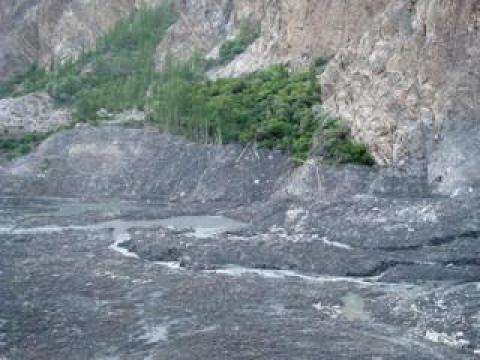Attabad Lake breach heralds potential major flooding in northern Pakistan

Authorities fear flooding could wash away many villages and bridges, affecting up to 50,000 people in Gilgit and Hunza-Nagar, and also risk the safety of villagers in five downstream districts of the Hazara region.
Many of the people of these areas are already living at subsistence level and a disaster of this magnitude will have devastating affects on their immediate survival needs Government officials have said the next 24 to 48 hours are crucial for the stability of the lake barrier. They are hoping the water will erode the landslide gradually, but have not ruled out a major breach due to rising water levels in the lake created by melting glaciers.
“At this point, the water flow is very smooth but it’s eroding the spillway, widening it”, said Gilgit-Baltistan Commissioner Asif Bilal Lodhi.
The lake has also submerged a 22-km stretch of the Karakoram Highway, a trade route for a significant portion of Pakistan\'s consumer goods from China.
The villages of Ainabad, Shishkat, Gulmit and Hussaini in the upstream areas of the lake have been inundated and more than 6,000 people have been evacuated to camps or host families in safer locations. Nearly 30,000 villagers who live downstream of the lake and landslide have also been relocated to camps established by the government.
The displaced families are facing the daily challenge of obtaining clean drinking water, food and clothing as they seek refuge with relatives or in the tented camps.
Although World Vision is not currently operational in the area, it has established a preparedness team to conduct an initial assessment in accessible locations in Gilgit Chilas, Besham/Shangla and Mansehra as soon as the waters recede. These locations have alternate access routes that do not depend on the Karakoram Highway, which may be damaged by a sudden breach and subsequent flash flooding.
Education and livelihood needs should be addressed to prevent a generational effect “Many of the people of these areas are already living at subsistence level and a disaster of this magnitude will have devastating affects on their immediate survival needs. Education and livelihood needs should be addressed to prevent a generational effect”, said Anita Cole, Programme Development and Quality Design for World Vision Pakistan.
Once on the ground World Vision can determine accessibility to cut off areas in coordination with local disaster management authorities in these more easily accessible locations.
World Vision plans to support the survival and return needs of 5,000 individuals with a focus on:
- shelter tool kits for restoring homes
- water purification kits including sachets,
- personal hygiene kits,
- family kits including clothing and cooking equipment.
World Vision will compliment these with World Food Programme-supported food distributions where possible, or will coordinate with food distributions in the same area. The short-term relief response will also involve psychosocial assistance, recreational activities for children and health checks.
Since 1992, World Vision has primarily focused on relief interventions in Pakistan. After the devastating October 2005 earthquake, World Vision expanded its operations in Pakistan. In 2007, World Vision started to work through partner organisations to respond to the critical situation of flood-affected people in the southern provinces of Balochistan and Sindh. Communities in five districts benefited from World Vision’s intervention targeting health, water and sanitation, education, and psycho-social support.
-Ends –
The landslide in early January blocked the Hunza River and created a huge lake near Attabad village. Twenty people were killed and another 25,000 were left stranded upstream, and now struggle to remain linked to the main town of Gilgit.
*1 cubic meter/second is equal to 35.3146662127 cusec - http://www.convertunits.com/info/cusec
For further information please contact:
Muhammad Ali
Senior Communications Officer,
World Vision International-Pakistan
Office Phone: +92(0) 51-265-1972 ext 109
Cell: + 92(0)345-856 7529 | Email: muhammad_ali@wvi.org
Skype name: mak4477
Anita Cole
Programme Design and Quality Director- Pakistan
World Vision International
Office Tel: +92 512651972-4
Fax:+92 51 2653199
Cell: 03458588913
Skype: anita.cole55